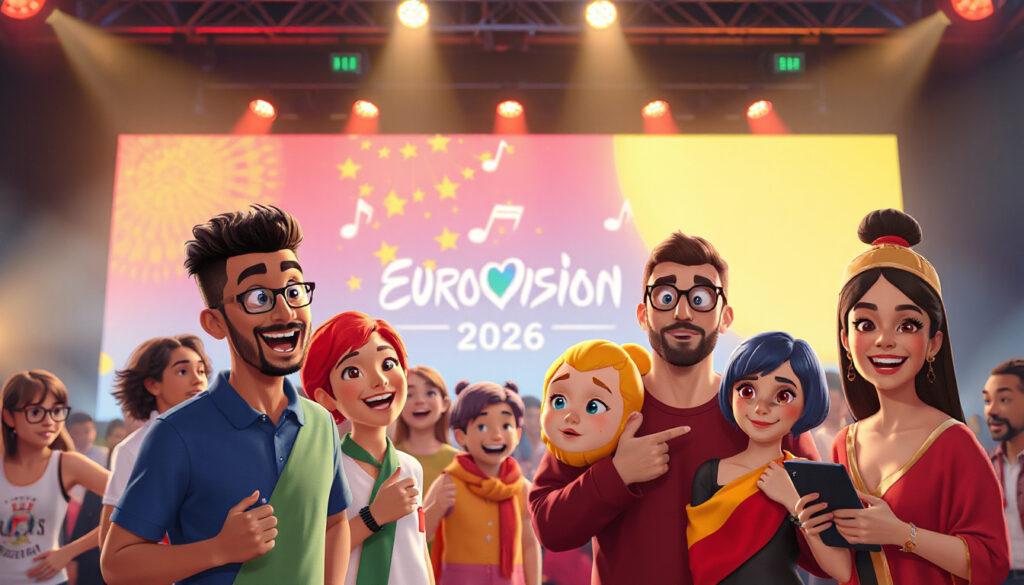Understanding Neighbor Voting Patterns in Eurovision 2026: What They Mean and Why They Matter
Every year, Eurovision draws eyes to brilliant acts and to voting lines that shape results. In Eurovision 2026, one voting style sparks debate and study: neighbor voting. What is neighbor voting? How does it affect the contest? What should fans and participants expect in this show?
Here is a clear look at neighbor voting in Eurovision 2026 and its wider impact.
What Is Neighbor Voting?
Neighbor voting happens when countries give high points to nearby or similar countries during the vote count. This style appears from the start of the contest and makes people ask if the voting is fair or if politics have a say.
Why Does Neighbor Voting Happen?
- Shared Culture and Language: Close countries share more than borders. They share food, songs, and words. This makes them choose songs that fit their own style.
- Diaspora Influence: People living far from home can vote. When many citizens from a country live abroad, they help give more points to that home country.
- Historical Relationships: Old ties and records bring friends together. Many viewers feel closer to acts that match their own history.
Evolution of Eurovision Voting Systems and Neighbor Bias
In early years, from 1956 to the late 1990s, votes came mainly from national juries. Experts chose who did best. Neighbor voting was there but became stronger when the public began to vote by phone in the late 1990s.
This change made people worry that nearby nations might tilt the results. The European Broadcasting Union then brought back expert panels in 2009. This step mixed public votes with professionals’ views.
How Will Neighbor Voting Shape Eurovision 2026?
Ongoing Debates About Voting Fairness
For Eurovision 2026, people who run the show check the system amid talks about clear voting.
- Some broadcasters from Belgium, Spain, Iceland, and Finland ask for a new look at phone voting.
- Questions come up on how current events or disagreements might change the numbers.
- Some are unsure if letting fans vote many times by phone is the best idea.
Even with these talks, the head of Eurovision says the voting rules work well. The rules catch odd patterns quickly.
Examples of Neighbor Voting in Practice
- Eastern Europe & Former Soviet States: In places like Ukraine, nearby nations and old allies give solid support. Many votes come from countries that share the same language or history.
- Ireland & United Kingdom: Ireland gets many votes from the United Kingdom and Northern nations that share a style. They may not be right next to each other, but they feel a bond.
- Diaspora Votes: Nations like Lithuania gain votes when their people living abroad vote, such as in the United Kingdom and Ireland.

Factors Beyond Neighbors That Influence Eurovision Success
Neighbor voting is one part of the scene. Other parts also shape the vote:
- Performance Order: The order in which a song is shown can sway votes. Acts shown near the end grab more views. Early acts, like in the second slot, often get fewer votes.
- Song Language: Songs in English tend to win more votes because many understand the language. Still, people now cheer songs in their own tongue after wins by non-English acts.
- Song Quality and Style: In the end, strong songs, creative presentations, and a clear emotion help win votes from both experts and viewers.
What This Means for Eurovision 2026 Fans and Participants
- Expect Clear Vote Results: All will look closely as votes are shared. Fans and entrants should see simple reports on how votes are counted.
- Neighbour Voting Stays in Play, Yet Gets Checked: Although nearby nations keep giving points, the mix of expert and public votes aims to keep the contest fair.
- Participants Must Think of Their Audience: Acts may show themselves in regions with close cultural ties or strong communities abroad to win more votes.
- Song Quality and New Ideas Win: Nations aiming for the prize will try new words and looks. They hope to charm both regular viewers and experts.
Next Steps: Following Eurovision 2026
With talks of changes in the vote, Eurovision shows it cares about a fair and fun contest. Fans who watch how neighbor voting works can expect detailed breakdowns after the live shows. Experts will point out votes from experts and the public, and map where votes come from.
For anyone in the contest, knowing how the vote works gives a smart edge. They can build links with fans through music and shared culture on a single stage.
Want to stay updated on Eurovision voting trends and 2026 developments?
Sign up for news from official Eurovision channels and check studies from voting experts and statisticians. This clear insight can help predict which acts will win and boost the joy of a contest that brings many voices together.
Understanding neighbor voting patterns adds a fresh view to Eurovision. Many see it as a mix of art and friendship. In the end, Eurovision is not just a show but a celebration of many shared stories on one stage.







